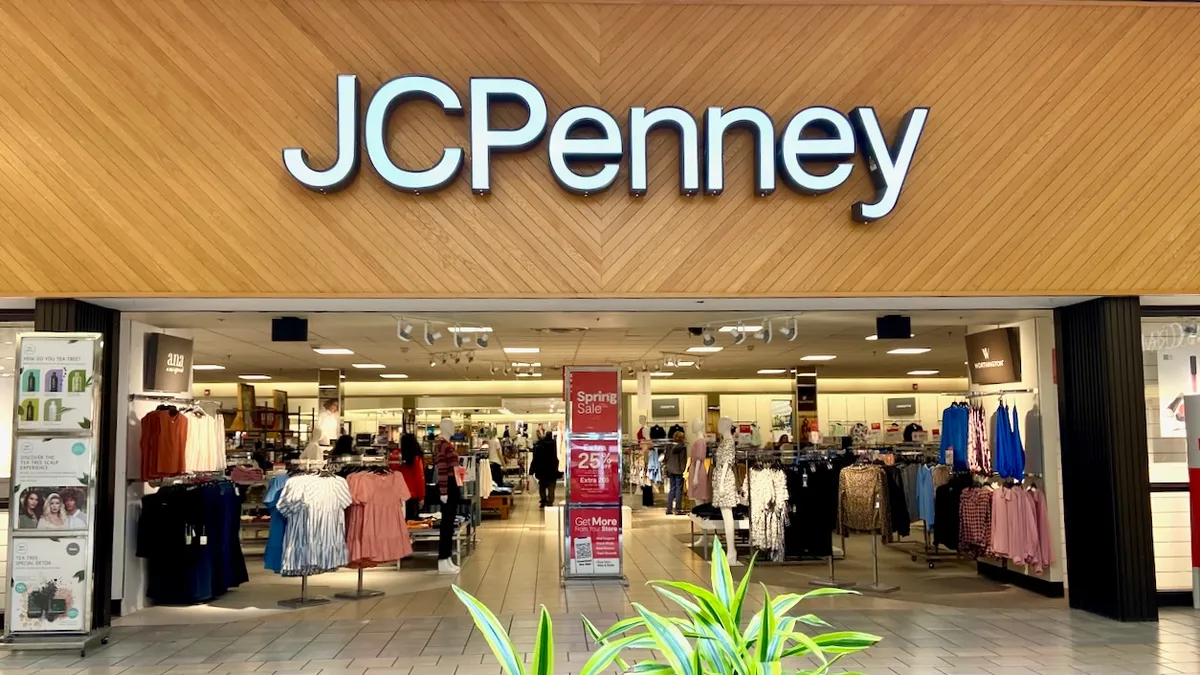Dive Brief:
-
Sparc Group, an operating entity that is a joint venture of brand firm Authentic Brands Group, fast-fashion e-retailer Shein and Simon Property Group, has formed a joint venture, Catalyst Brands, with J.C. Penney. This entailed an all-equity transaction between them, with shareholders Simon, Brookfield Corporation, Authentic and Shein.
-
Mall REITs Simon and Brookfield acquired J.C. Penney about four years ago, and Authentic later also took a stake. Marc Rosen, formerly J.C. Penney’s CEO, is now CEO of Catalyst Brands, according to a company press release.
-
Catalyst includes brands whose IP is owned by Authentic and whose operations were run by Sparc — Aéropostale, Brooks Brothers, Eddie Bauer, Lucky Brand and Nautica — plus J.C. Penney private labels and exclusives like Stafford, Arizona and Liz Claiborne. Catalyst has sold Reebok’s U.S. operations and is exploring strategic options for Forever 21’s operations; both have been owned by Authentic and run by Sparc.
Dive Insight:
This shakeup of brands loops J.C. Penney into an operating entity involving familiar players, including many executives who, like Rosen, were already at Penney or Sparc. The company is based at J.C. Penney’s headquarters in Plano, Texas, with offices in New York, Los Angeles and Seattle.
Michelle Wlazlo, formerly Penney’s chief merchandising and supply chain officer, has been promoted to brand CEO of J.C. Penney. Natalie Levy continues her role as brand CEO of Aéropostale, Lucky Brand and Nautica. And Ken Ohashi, who has been leading Brooks Brothers, will be brand CEO of Brook Brothers and Eddie Bauer. These brand chiefs report to Rosen, per the release.
Former Walmart executive Kevin Harper will join Catalyst as chief operating officer, and Marisa Thalberg, formerly J.C. Penney’s consulting chief marketing and brand officer, is now Catalyst’s chief customer and marketing officer.
In a statement, Rosen said the new combination, formed via a transaction of an undisclosed amount, will have many benefits.
“Our relationships with more than 60 million customers and the deep data we have create a compelling consumer value proposition across our brands,” he said. “We can design a more personalized shopping experience, offer unified loyalty and credit card programs, and ultimately, cross-sell more effectively.”
It comes as Penney continues to struggle. In its most recent quarter, the department store’s loss narrowed, but net sales tumbled 8%, and in the first nine months of the fiscal year, consolidated adjusted EBITDA plunged nearly 64% to $66 million.
It is now sharing company with other brands that are also floundering, according to Mark Cohen, a retail veteran who previously ran retail studies at Columbia Business School.
Most, if not all, of the brands in Catalyst’s stable were plucked out of bankruptcy by Authentic, Simon and Brookfield, or some combination, though Simon has divested from or reduced its stake in Authentic, Sparc and Eddie Bauer. Cohen shares the common view that Simon and Brookfield in particular have invested in many of these brands in order to keep those tenants in their malls, though Brookfield Properties U.S CEO Kevin McCrain last year told Retail Dive that the motivation was to preserve jobs and help these legacy retailers evolve.
Cohen doesn’t see much progress ahead, however, given the track record so far, particularly at J.C. Penney, which is especially important to its landlord-owners because its stores are anchors. Of four recent Penney closures, none were at a Simon or Brookfield mall.
“In the face of little to no success bringing JC Penney back to life, here comes a scheme which presumes that these captive brands will resuscitate the business. Will any of these brands resonate with a past or future JC Penney customer?” Cohen said by email. “I suppose hope springs eternal but frankly this looks like a desperate attempt to turn a pig’s ear into a silk purse.”
















